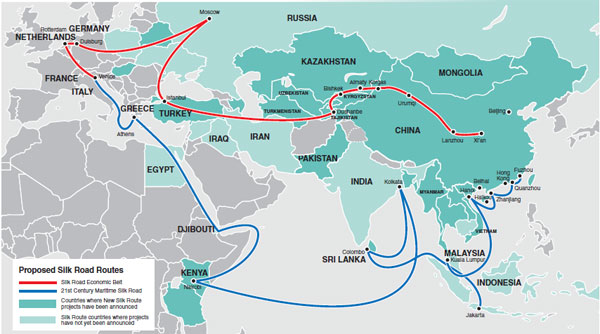Port operator sees bright outlook across region
Updated: 2016-05-18 07:46
By Zhang Haizhou in Hong Kong(HK Edition)
|
|||||||
HK-based company is reporting strong growth in Belt and Road economies in spite of the sluggish global economy
Hutchison Port Holdings (HPH), a world-leading port investor, developer and operator, is upbeat about the business and is improving its terminal infrastructure as trade activities in Belt and Road regions keep growing.
The Belt and Road Initiative, proposed by President Xi Jinping in 2013, aims to improve connectivity along the historical land and maritime Silk Roads.
Speaking to China Daily, Eric Ip, group managing director of HPH said some of its terminals in Asia and the Middle East have seen "double-digit year-on-year throughput growth, as result of the increasing trade activities in the regions".
The message from the Hong Kong-based company is encouraging, even as the prospects for global trade remain dim, according to the World Trade Organization. It also reflects the positive impact of the Belt and Road Initiative.
HPH's extensive port and logistics network - one of the largest in the world - has a strong presence along the Maritime Silk Road. A total of 22 of its 48 ports are located in key Belt and Road countries including Tanzania, Oman and Pakistan, as well as China, where the company has a strong presence.
Throughput of the Oman International Container Terminal, according to Ip, grew by 66.7 percent in 2015 from the previous year.
Throughput of the terminals of the Port of Laem Chabang in Thailand and in Karachi, Pakistan, also registered impressive year-on-year growth rates, of 9.5 percent and 11 percent, respectively, in 2015.
Ip said that the group sees the need to improve infrastructure and develop additional container-handling capacity at its terminals as among the "current concerns shaping" its development.
At International Port Services in Dammam, Saudi Arabia, which has seen consistent year-on-year throughput growth, for example, an additional berth has been added, and it has become the first port in the region to deploy remote-controlled semi-automated cranes and an automated gate.
In China, Ip said there are ongoing expansion and productivity enhancement projects to increase yard space and quay length in Yantian International Container Terminals in Yantian Port in Shenzhen, and strengthen its barge network in Hong Kong International Terminals, which is extending its catchment area far from the sea port.
"The ports have their strategic roles," Ip said. "Yantian is a leading natural deep-water gateway for South China where it handles 100 percent of all the ultra-large container vessels, whereas Hong Kong is an effective South China gateway port as well as transshipment hub in Central Asia."
China's overseas trade in goods in the first quarter of this year dropped by 5.9 percent compared to the same period last year, according to customs data.
But China's exports to some Belt and Road countries have surged. Exports to Pakistan and Bangladesh grew by 26.4 percent and 16.6 percent, respectively, in the first three months. Exports to Egypt, India and Russia have increased by more than 6 percent.
"The transport sector - especially ports - will first feel the effects of the Belt and Road Initiative," China Enterprise News quoted Silk Road specialist Bian Hongdeng as saying.
For HPH, the initiative "has generated a lot of interest from both the public and private sectors", Ip said.
"When we are in a country, we constantly develop modern facilities and expand our handling capacity," Ip said, adding that its developments in Silk Road countries have also promoted the growth of local industries.
"In many cases, we are the first operator in a country to implement new technology - we train local staff, and develop extensive connections with road, rail and sea routes through capital investment."
An opportunity
Meanwhile, being a participant in the construction of major infrastructure projects and witnessing the benefits that they bring to communities, Hsin Chong Group Holdings Ltd, one of Asia's longest-standing construction groups, sees the Belt and Road Initiative as "an important opportunity for enhancing global connectivity, trade and logistics.
"For Hong Kong businesses and industries, there is indeed a role for us to play," Executive Director and Chief Executive Officer Joseph Choi Kin-hung said.
"Hsin Chong is actively exploring opportunities under the initiative, with a view to making contributions by leveraging on our expertise and experience in engineering and project management, and to promote Hong Kong's strength as a 'super-connector'," he added.
zhanghaizhou@chinadaily.com.cn

(HK Edition 05/18/2016 page8)